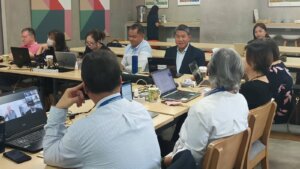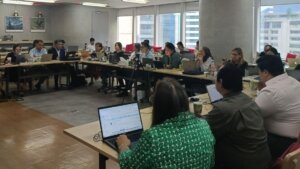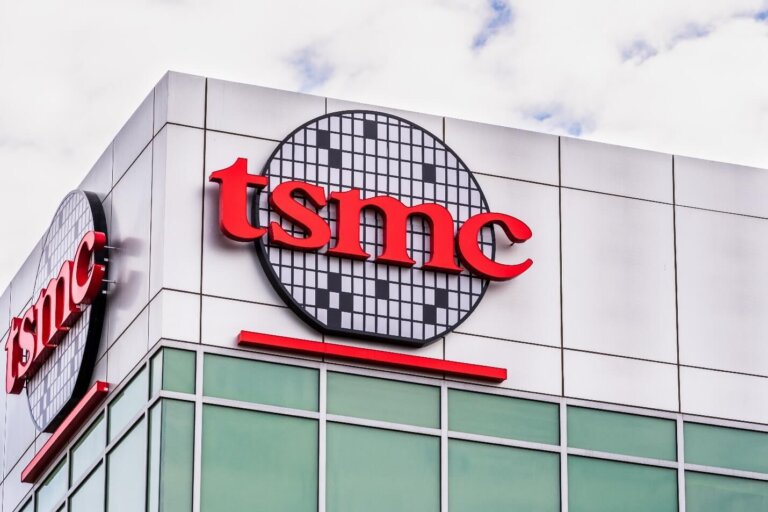In the fifth session of the Executive MBA (EMBA) program, held on February 19, 2025, we studied the complex geopolitical dynamics between Taiwan, China, and the U.S. Our discussion focused on how economic policies, trade relationships, and strategic competition shape the global business landscape. We examined the case study “Chipmaking in the Desert: Taiwan Semiconductor Manufacturing Company’s Global Expansion” and the article “The Strategic Challenges of Decoupling,” both of which provided valuable insights into the impact of geopolitical shifts on supply chains, national security, and technological innovation.

TSMC’s Global Expansion: Navigating Geopolitical Uncertainty
TSMC’s Role in Global Semiconductor Manufacturing
Taiwan Semiconductor Manufacturing Company (TSMC) is a global leader in semiconductor foundry services, supplying key companies such as Apple, AMD, and Nvidia. Its chips power various industries, from consumer electronics to artificial intelligence and automotive technology.
Strategic Expansion Plans
TSMC’s decision to expand beyond Taiwan is driven by the need to diversify its manufacturing locations, mitigate supply chain risks, and adapt to the growing influence of geopolitical tensions, particularly between the U.S. and China.
Establishing a Presence in the U.S.
A major step in this expansion is constructing a semiconductor fabrication plant (fab) in Arizona. This move is aimed at strengthening supply chain security, aligning with U.S. policies that encourage domestic semiconductor production, and ensuring continued access to the American market.
Challenges of Global Expansion
While TSMC’s cutting-edge 5nm and 3nm chip technologies place it at the forefront of innovation, replicating its highly efficient Taiwanese operations in new locations presents significant challenges. Differences in labor costs, supply chain logistics, and technological expertise require strategic adaptation.
Key Considerations
- Geopolitical Risks – The U.S.-China trade war has heightened concerns over supply chain vulnerabilities, making it essential for companies like TSMC to secure alternative production bases.
- Economies of Scale – TSMC’s cost efficiency is tied to its Taiwan-based operations. Expanding to other countries means navigating higher operational expenses and a different regulatory environment.
- Supply Chain Security – The COVID-19 pandemic exposed weaknesses in semiconductor supply chains. TSMC’s global footprint aims to enhance resilience while maintaining technological leadership.
- Talent and Knowledge Transfer – Semiconductor manufacturing requires highly specialized expertise. Ensuring that new facilities achieve the same level of efficiency as those in Taiwan remains a critical challenge.
The Bigger Picture: TSMC’s Strategic Path Forward
TSMC’s expansion strategy reflects a calculated response to geopolitical uncertainty and evolving market demands. While diversifying its production base enhances resilience, successfully replicating its world-class manufacturing model outside Taiwan requires substantial investment in infrastructure, talent, and operational efficiency.

The Strategic Challenges of Decoupling
Understanding Strategic Decoupling
Strategic decoupling refers to the deliberate separation of economic and technological interdependence between the U.S. and China. This shift is driven by national security concerns, trade policies, and efforts to create independent supply chains.
Key Sectors Affected
Decoupling is most evident in the technology and manufacturing sectors, where countries are pushing for greater self-sufficiency in areas such as semiconductors, artificial intelligence, and telecommunications.
The U.S.-China Rivalry
Both nations are investing in separate technological ecosystems to reduce reliance on each other. The U.S. is restricting China’s access to advanced technologies, while China is accelerating efforts to build homegrown innovations in response.
Impact on Global Supply Chains
Fragmenting supply chains could lead to higher costs, inefficiencies, and slower innovation. As companies navigate this shift, they must balance the need for security and resilience with the benefits of global collaboration.
Key Considerations
- Economic Consequences – Decoupling increases costs for businesses, as firms must develop redundant supply chains to comply with new trade regulations.
- National Security Concerns – The U.S. and China view technological independence as a strategic imperative, leading to export restrictions, tariffs, and regulatory barriers.
- Innovation Challenges – Restricting international cooperation could slow down technological advancements, as firms lose access to global talent and expertise.
- Long-Term Industry Shifts – The world may see the emergence of two distinct technological ecosystems, one dominated by the U.S. and its allies, and the other by China and its partners.
Navigating a Fragmented Global Economy
Strategic decoupling represents a fundamental transformation in global trade and technology development. While it may enhance national security and resilience, it also poses risks of economic fragmentation, innovation slowdowns, and supply chain disruptions. As geopolitical tensions shape the future of global commerce, businesses must adapt to an increasingly divided landscape while seeking opportunities for sustainable growth and collaboration.

Final Thoughts
The insights from the fifth EMBA session highlight the far-reaching impact of geopolitical shifts on global business strategies. TSMC’s expansion underscores the challenges of navigating supply chain vulnerabilities, while the concept of decoupling illustrates the broader economic and technological realignment shaping international markets. As companies and nations adjust to this evolving landscape, strategic decision-making and adaptability will be key to long-term success.
Stay Ahead in a Changing Global Landscape
Geopolitical shifts are reshaping global supply chains and business strategies. Understanding these complexities is crucial for staying competitive. At John Clements Consultants, we help businesses navigate these challenges with expert talent solutions and strategic insights.
Contact us today and learn how we can support your global workforce needs.





